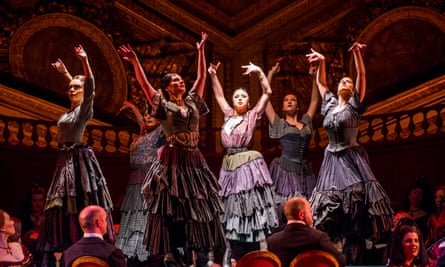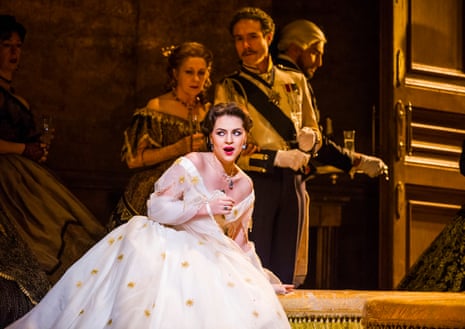According to statistics compiled by the website Operabase, La traviata is now the most popular opera in the world, a status reflected in the no less than three casts who will pass through Richard Eyre’s safely traditional production this season, as if it were a revolving door for singers. In fact, the first cast was not quite as expected, because Albanian tenor Saimir Pirgu – due to sing Alfredo – withdrew on the day of the opening performance suffering from a throat infection.
His ready replacement was Samuel Sakker. Though his voice may not be ideally Italianate, the young Australian tenor gained confidence as the performance proceeded, cutting an authentically engaging figure as the ingénu lost amidst the giddy whirl of the mid-19th century Parisian demimonde – though these days, in Eyre’s 21-year-old staging, that particular milieu looks rather less tantalising than one might hope for.

Singing the role of the frail, self-sacrificing courtesan with whom Alfredo falls in love is Russian soprano Venera Gimadieva, who made a definite splash as Violetta at Glyndebourne 18 months ago. Elegant both in voice and physique, she nevertheless finds the hectic close of the first act – when Violetta declares her intention to live for pleasure alone in fistfuls of coloratura – an exacting challenge; yet her vocal vagueness here turns into something more solid and involving when she encounters Luca Salsi’s distinguished Germont for their game-changing duet in Act 2. If the nuanced Italian baritone turns out to be the finest of the three principals, he appears to inspire Gimadieva to raise her own stakes from that crucial scene onwards.
Among the smaller roles, Yuriy Yurchuk makes an aptly glacial Baron Douphol while James Platt makes you notice Doctor Grenvil. Yves Abel conducts capably, though without generating a memorable level of theatrical excitement.
- In rep at the Royal Opera House until 19 March. Buy tickets at theguardianboxoffice.com. The production will be relayed live in cinemas on 4 February

Comments (…)
Sign in or create your Guardian account to join the discussion